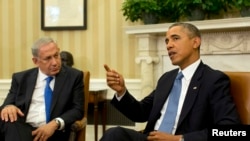Strained diplomatic tensions between the U.S. and Israel further frayed this week after an anonymous U.S. official was quoted in a magazine article characterizing Israeli Prime Minister Benjamin Netanyahu using a profane slang that means “worthless coward.”
Netanyahu fired back Wednesday during a memorial ceremony in parliament for an assassinated Israeli official.
"Our supreme interests, chiefly the security and unity of Jerusalem, are not the main concern of those anonymous officials who attack us and me personally, as the assault on me comes only because I defend the State of Israel," Netanyahu said.
The dust up left the Obama administration scrambling to undo the political damage.
"We think such comments are inappropriate and counter-productive," said Alistair Baskey, Deputy Spokesperson for the White House's National Security Council told Israel’s Haaretz.
That was echoed by State Department Jen Psaki, who said during a briefing, “ I spoke to the Secretary about this this morning and he certainly feels strongly that a war of words is not productive from either side.”
Tensions go back months
Even before the article was published, U.S. and Israeli media were buzzing, declaring relations between the two allies are at a crisis point after months of diplomatic jabs and political snubs.
“We mustn’t pretend there isn’t a crisis,” Israeli Finance Minister Yair Lapid said at an event in Tel Aviv Saturday. “Our relations with the U.S. are vital and everything that can be done must be done to end this crisis.”
The latest tensions began in January, when Israeli media quoted private remarks by defense minister Moshe Yaalon criticizing U.S. Secretary of State John Kerry for acting “out of misplaced obsession and messianic fervor” during the last round of peace talks.
“The defense minister had no intention to cause any offense to the secretary, and he apologizes if the secretary was offended by words attributed to the minister,” read a statement the defense ministry released March 20, which the U.S. rejected.
“We are disappointed with the lack of an apology from Defense Minister Yaalon’s comments,” a State Department spokesperson later told reporters.
When Ya’alon visited Washington last week, according to the Jerusalem Post, he hoped to meet with Kerry, Vice President Joe Biden and National Security Advisor Susan Rice, who turned him down.

Alan Elsner
U.S.-Israeli relations have always had their ups and downs, says Alan Elsner, vice president for communications at J Street, a nonprofit advocacy group which calls itself pro-Israel and pro-peace.
“I think there has been a slow but steady deterioration in the relationship,” Elsner said. “I don’t think that I would say we are in a crisis, but I would say we are headed toward a crisis if trends continue the way they are.”
David Makovsky, director of the Washington Institute for Near East Policy’s Project on the Middle East Peace Process, speaks as if these tensions were inevitable: After all, Obama, now in his second term as president, and Netanyahu, serving his third as Israeli premier, have a history together, battling tough issues.
“When you have two parties dealing with each other for six years, what happens is that baggage accumulates,” Makovsky said. “And sometimes the sum comes across as greater than its parts.”

David Makovsky
Mercurial relations
Back in late 1997, former President Bill Clinton refused to meet with Benjamin Netanyahu during the latter’s visit to the U.S. Two months later, Netanyahu returned to Washington, where he met with Clinton’s most relentless critics and was subsequently refused a visit by the White House. At issue then, as now, was the deadlocked peace process.
Today, says Elsner, an even more contentious issue is threatening the relationship: the nuclear deal with Iran. As the November 24 deadline approaches, Elsner predicts the U.S.-Israeli friendship will strain even further.
The talks aim to get Iran to reduce its nuclear enrichment program in exchange for lifting tough economic sanctions. Iran steadfastly denies it seeks to build a bomb, but Netanyahu has accused Tehran of trying to “bamboozle its way to an agreement” and go on to develop nuclear weapons.
“I think that now everyone is waiting to see if there is going to be an agreement with Iran,” Elsner said. “And if there is, then I think we can expect some very, very angry words and some very strained, battered feelings on both sides.”
Many observers doubt a deal can be reached by the end of next month and predict that P5+1 will extend negotiations by another six months. By then, midterm elections will have passed and the complexion of the U.S. Congress may be greatly changed, something Netanyahu may be counting on.
If a deal is reached, Elsner says there isn’t really much that Israelis can do about it. With one exception: They could appeal to the U.S. Congress.
“So, hypothetically,” Elsner said, “let’s assume that there will be an agreement on Iran and that the Iranians retain the ability to enrich uranium. If Israel actively—even trying to keep its fingerprints off of it—tries to line up, mobilize opposition to try to sabotage the agreement to Congress using mostly Republicans but also some Democrats, then I think you are going to have a real problem.”
There is already considerable opposition in Congress to any deal if Tehran doesn’t step up cooperation with the International Atomic Energy Agency (IAEA). On October 1, House Foreign Relations Committee Chairman Rep. Ed Royce (R-Calif.) and Rep. Eliot Engel (D-NY) were among 354 members of 435 House Member who signed a letter to Secretary Kerry calling for more transparency out of Iran.
“We believe that Iran’s willingness to fully reveal all aspects of its nuclear program is a fundamental test of Iran’s intention to uphold a comprehensive agreement,” the letter read.
Most analysts agree that the relationship between Obama and Netanyahu at the moment is chilly, at best. But they say the relationship between the countries themselves—and their militaries—are rock-solid.
“The underlying relationship, which is expressed in myriad ways--in daily cooperation, in military cooperation and cultural exchanges, tourism, academic exchanges and business ties--is extremely deep, extremely wide and extremely strong,” Elsner said.
Makovsky downplays the current rift.
“Someone has described the friendship as ‘too big to fail,’” he said. “Unfortunately, when certain adversaries of the relationship see a lot of daylight in between the parties, they sometimes want to drive a truck right through it and create a wedge even further.




